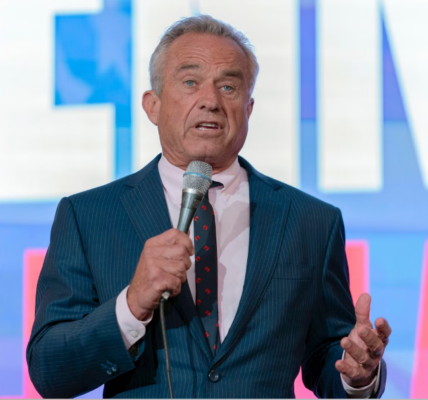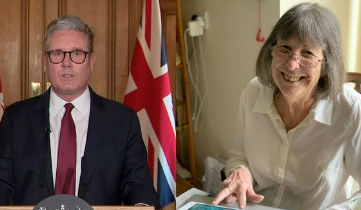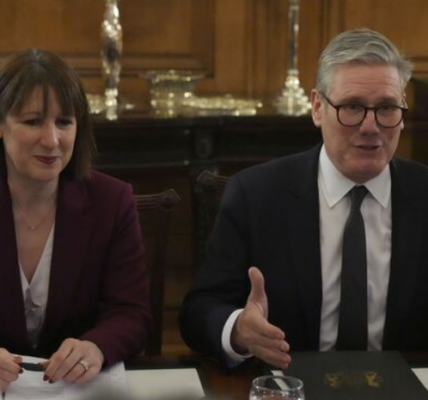From Michael Matheson’s iPad bill to Yousaf’s self-destructive showdown with the Greens, the wreckage of another turbulent political year_Nhy
It was a year of dizzying highs and jaw-dropping lows which saw the political order begin to shift.
Scandal and incompetence continued to dog the SNP, weakening their dominance while Labour began to surge again after years during which they seemed doomed beyond salvation.
The past 12 months in Scottish politics have been filled with drama. As 2024 draws to a close, it’s very difficult to conclude the country’s in better shape than it was at this time last year.
JANUARY – After a painful and turbulent year for the SNP, Humza Yousaf kicked off 2024’s January sales with an offer that looked too good to be true.
If Scots voted for independence, he said, the average household would be better off to the tune of £10,200-a-year. Not bad – in fact, almost enough to cover former health secretary Michael Matheson’s dodgy expenses.
A new year, said Mr Yousaf, was a time for hope and optimism, a view shared by a number of his colleagues who hoped to get rid of him and were optimistic that they would soon be able to do so.


Humza Yousaf promised hope and optimism for 2024
“If we can say one thing about 2024,” said Mr Yousaf during a speech about independence, “it certainly won’t be uneventful.”
He was to be proved correct before the month was out when it emerged that Nicola Sturgeon had, despite earlier promising that she would make available to the Covid Public Inquiry all digital communications sent and received during the pandemic, deleted months of WhatsApp messages.
Those who had feted her “communication” and “leadership” during the global health crisis could add “backside covering” to their lists of Ms Sturgeon’s skills.
FEBRUARY – As the year progressed, so the SNP’s misery deepened. When, three months earlier, it emerged that then health secretary Michael Matheson had wrongly claimed almost £11,000 in expenses run-up while his sons watched football on a parliament-issued iPad during a family holiday, Humza Yousaf was adamant his friend should stay in his cabinet.
Mr Yousaf maintained the position that Mr Matheson was entitled to keep his highly-paid role right up until the moment that Mr Matheson resigned.

Michael Matheson was embroiled in a scandal after billing the taxpayer for a huge data bill
The former health secretary jumped before publication of a Holyrood report which was highly critical of his actions. Mr Matheson was later suspended from Holyrood for 27 days and lost his salary for 54 days.
MARCH – With speculation over when sitting Prime Minister Rishi Sunak might call a general election, Humza Yousaf decided it was time to gee-up the nationalist troops.
In a speech to SNP members, he declared: “We have an alternative to broken Brexit Britain.That alternative is independence. That is why the SNP will win the General Election in Scotland.”
The pathos was almost unbearable.
APRIL – Humza Yousaf entered April with a cunning plan which would, in one dramatic move, reassert his authority and reunite his party.
After growing disquiet in SNP ranks about the party’s power-sharing agreement with the Scottish Greens, Mr Yousaf decided to flex his political muscles. He summoned Green co-leaders Patrick Harvie and Lorna Slater to his office and sacked them.
Any satisfaction Mr Yousaf felt was to be short-lived. Within minutes of the Greens removal from government, Mr Harvie and Ms Slater were loudly complaining to whichever journalist they bumped into about the First Minister’s actions. Soon, speculation was rife that the Greens would back an opposition motion of no confidence in Mr Yousaf.
On April 30, just 13 months after taking office, Mr Yousaf announced his decision to resign as First Minister.
He really was right about 2024 being eventful.
MAY – He had been planning his departure from political life but John Swinney is nothing if not loyal to the SNP. So, when Humza Yousaf’s resignation created a fresh crisis for the party, the former deputy First Minister stepped in.
Mr Swinney – who previously led the party without distinction between 2000-04 – was elected unopposed as SNP leader and became Scotland’s seventh First Minister.
His first decision was to appoint former Finance Secretary Kate Forbes as his deputy.
During 2023’s SNP leadership election, allies of Mr Swinney’s briefed against Ms Forbes on the basis that her conservative Christian views would prove divisive. Now those same allies briefed that the promotion of someone with her conservative Christian views showed the SNP was a broad church.
Any hopes Mr Swinney may have harboured that he might ease back into leadership were destroyed on the 22nd of the month when Prime Minister Rishi Sunak announced a general election for July 4.
Any hopes SNP members may have harboured that Mr Swinney was the man to restore their fortunes were destroyed precisely one week later when he announced his party would not support the recommended sanctions against Michael Matheson.
Mr Swinney’s defence of Mr Matheson completely overshadowed the launch of the SNP’s general election campaign. We knew this to be true because the first the big news story about the SNP campaign was Mr Swinney saying it hadn’t been overshadowed by the Matheson affair. And you can’t get more overshadowed than that.
JUNE – Scottish Labour candidates risked getting cocky as polls suggested their party might, for the first time since the 2011 general election, win more Westminster seats than the SNP.
SNP candidates, on the other hand, grew increasingly despondent as the month progressed.
The official version of events was that the nationalists were hearing positive noises “on the doorsteps”. The truth was that very many doorstep conversations involved voters asking SNP candidates why on Earth the party was continuing to defend Michael Matheson.

The general election campaign proved to be miserable for former Scottish Conservative leader Douglas Ross
If the general election campaign was difficult for John Swinney, it was miserable for Douglas Ross, then leading the Scottish Conservatives.
Mr Ross – who was both an MP and MSP before the general election – had earlier announced that he would give up his Westminster seat. But shortly after Rishi Sunak announced the election, Mr Ross changed his mind and decided to stand in the Aberdeenshire North and Moray East seat. His selection as candidate was assured after Conservative HQ ousted the man who had been expected to fight the seat – David Duguid, who was then in hospital – on the grounds that he was not well enough to fight the campaign.
It was a grubby little stitch up that would backfire with entertaining consequences.
JULY – Misery for both John Swinney and Douglas Ross. On Thursday July 4, Scots voted to send 37 Labour MPs to Westminster and just nine representatives of the SNP. Those results – an increase of 36 for Labour and the loss of 39 for the SNP – had some nationalists muttering about whether Mr Swinney was the right man to lead.
Poor Mr Ross, having announced his resignation as Scottish Tory leader, failed to win a Westminster seat, and returned to Holyrood, there to sit alongside colleagues who thought him a rotter.
Labour’s Anas Sarwar, on the other hand, was publicly thrilled and gladly accepted praise for his questionable role in his party’s success.
Privately, some in Scottish Labour were nervous. What if their success was largely down to a get-the-Tories-out voter strategy? Could they replicate these results in the 2026 Holyrood election and make Mr Sarwar first minister?
AUGUST – The shocking sight of race riots in England and Northern Ireland created a rare period of unity in Scottish politics. John Swinney called a meeting of faith and political leaders where important declarations of solidarity were made.
In major cities, concerned citizens – from centre-right Tories to radical lefties – marched together in protest at the violent actions of extremists.
The consensual words of leaders in Scotland during those dark days was a rare example of politics at its best.
SEPTEMBER – The drama that has engulfed the SNP over recent years made it to our television screens. A BBC documentary on the breakdown in the relationship between Alex Salmond and Nicola Sturgeon, which was caused by her refusal to stand by him when he was accused of inappropriate behaviour by a number of female colleagues.
September also saw the 10th anniversary of the referendum on independence, a moment John Swinney mark with a most bizarre prediction.

The late former First Minister Alex Salmond
The First Minister argued that, since polling showed 63 per cent of under-35s supported independence, it was only a matter of time until theirs became the majority views. “Take heart, friends, for our enemies will get old and die” is hardly the most inspiring stuff.
It’s also fatally flawed. Since 2014, around half a million Scots have died. The majority of them were (and polling confirms as much) No voters. If younger Scots are fully committed to the nationalists’ project, this simple fact of life and death should have seen support for Independence soar. It has not done so.
Maybe some people grow out of nationalism.
If the political response to violence on the streets in August was admirable, the response to another matter in September was deplorable.
An independent review into catastrophic failings at Edinburgh Rape Crisis Centre found the now-departed chief executive, trans woman Mridul Wadhwa, had failed to protect women-only spaces, failed to set professional standards of behaviour, and did not understand the limits on her role’s authority.
Under Wadhwa’s regime, counsellor Roz Adams was forced out of her job for daring to hold gender critical beliefs.
Neither John Swinney nor Anas Sarwar felt the need – or, more accurately, had the courage to speak out about this scandalous state of affairs. Both men may be privately sceptical about the gender ideology so enthusiastically embraced by some of their colleagues but neither had the moral fibre to say so.
This left newly elected Scottish Conservative chief Russell Findlay as the only major mainstream political leader willing to speak out against the dangers of gender ideology.
OCTOBER – The death of former First Minister Alex Salmond at the age of 69 stunned Scottish politics. In life, a divisive character, his death united even his fiercest political foes in praise of his skills as a parliamentarian and campaigner.
Mr Salmond collapsed while attending a conference in North Macedonia on October 12 and was buried after a private service in Strichen on the 29th. Neither John Swinney nor Nicola Sturgeon attended.
NOVEMBER – The SNP’s leader at Westminster, Stephen Flynn, is one of the most talented politicians of his generation. And if you don’t believe me, just ask Stephen Flynn.
The nationalists’ man in the imperial capital isn’t short on self-belief and so he must have assumed colleagues would react with raptures of joy when he announced his plan to stand for election to Holyrood in 2026.
Mr Flynn’s plan – in keeping with most produced by senior SNP politicians – soon began to fall apart.
Not only did he anger allies of MSP Audrey Nicoll, whose seat he plans to seize, but he left his party open to the allegation that by “double-jobbing” he’d be taking voters for granted.
Apparently surprised by this entirely predictable backlash, Mr Flynn attempted to smooth things over.
“I don’t want to be doing this,” he told the BBC, “But that’s the reality of politics sometimes – it’s not pleasant.
“I’m not going to shy away, I’m not going to be hounded out from standing for what I believe in.”
Oh, the selflessness of the man.
Days later, Mr Flynn U-turned, pledging that he did not intend to hold a dual mandate.
Whether that means he’ll quit Westminster to stand for Holyrood is not yet clear,
DECEMBER – The nights may be dark but the mood in the SNP began to lighten in December after finance secretary Shona Robison announced a draft budget designed to make life miserable for Scottish Labour.
Ms Robison proposes to maintain the winter fuel payment for pensioners in Scotland and to lift the two-child cap on benefits, measures which Anas Sarwar and his party will struggle to oppose.
There are small details to be smoothed over such as the fact the finance secretary can’t actually tell us how this largesse will be funded but let us not worry about that just now.
Let us instead rejoice at the generosity of a Scottish Government that, when the going gets tough, starts giving out freebies like a drunk Santa on his last day in the job.



